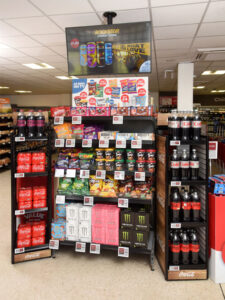ScotGov eyes tougher restrictions than the rest of UK

THE Scottish Government has set out its long-awaited proposals for high in fat, salt and sugar (HFSS) foods.
In a new consultation, set to finish on 21 May, ScotGov has asked businesses to respond to its proposals on its approach to HFSS.
Jenni Minto MSP, minister for public health and women’s health, said: “Scotland has an issue with high levels of overweight and obesity and poor diet, which can have serious consequences for our health.
“The association between poor diet, excess weight and health outcomes such as heart disease, type 2 diabetes and certain cancers has been established for some time/
“What surrounds us shapes our health. This is why measures to transform the food environment are so important – to support people to eat well by making the healthier choice, the easy choice.”
Falling mostly in line to the regulations in England and Wales, ScotGov has included some additional new proposals which will see Scotland restrict further promotional activity in stores.
Restrictions for multi-buy products sees a similar approach to that south of the border, which will see a ban on promotions of multi-buys – such as 2 for 1, 2 for the price of £1 or buy 3 and get the fourth free etc. – across pre-packed HFSS products.

This will also apply to products that shout out about a certain percentage of the product that is free, which ScotGov has given manufacturers 12 months to phase out across their packaging, if introduced.
Differing from England however is the Scottish Government’s intentions on meal deal promotions. ScotGov aims to introduce restrictions on the lunch time meal solution out of three potential options.
These include: ‘Meals Deals cannot contain HFSS targeted foods’; ‘Meal Deals can contain up to one HFSS targeted foods’; ‘Meal Deals cannot contain targeted HFSS discretionary foods’.
The final option is thought to offer retailers greater flexibility in the meal deal with ScotGov noting a HFSS discretionary food as “foods that provide little or no nutritional benefit and are not necessary for a healthy diet, for example crisps, confectionary, cakes, soft drinks with added sugar”.
The Scottish Government is also seeking to ban temporary price reductions on HFSS products, which would see some food deals for Christmas be consigned to the Ghost of Christmas Past if allowed.
Location restrictions are also to be consulted on as well, with Scotland, again, mostly falling in line with restrictions across the UK with some additional rulings of its own.
The consultation will consider restrictions on locations such as checkout areas, end of aisles as well as front of store for HFSS products but, in a difference to England and Wales, Scotland would also seek restrictions on promotional bins across stores including free-standing display units.
There are some exemptions here however, with stores under 2,000 square foot exempt to location restrictions as well as specialist stores such as chocolatiers and sweet shops as well as a potential exclusion for businesses with less than 50 staff members.
Businesses have until 21 May to respond to these proposals and can do so via ScotGov’s consultation hub Citizens Space.
The Scottish Grocers’ Federation has welcomed the exemptions for businesses with fewer than 50 staff as well as the location exemptions but has warned that those hit by the new HFSS regulations could be put at a disadvantage.
Pete Cheema, chief executive at the SGF, said: “Placing an additional burden on struggling stores at this time will mean that customers inevitably must pay more for their shopping, and businesses are less viable overall.
“For that reason, we strongly believe that the exemption for location restrictions should be increased to 3,000 square feet. As we have called for throughout the process.
“We are also concerned that these proposals could have a significant and disproportional impact on some small Scottish producers. Many of whom are a celebrated part of the Scottish food and drink sector.
“Over the coming weeks, we will be studying the detail of the proposals and developing a set of robust recommendations to ensure the voice of the convenience sector in Scotland is heard.”
Ewan MacDonald-Russell, deputy head of the Scottish Retail Consortium (SRC), said the timing of the Scottish Government’s consultation on the matter will only put consumers at a disadvantage during a troubling financial time.
He said: “Scottish Ministers appear determined to put up prices on a range of products despite consumers reeling from a cost-of-living crisis. These proposals will prevent retailers competing on price on any of the products caught by these rules, meaning shoppers miss out both on the benefits of competition but also from any falls in inflation.
“The restrictions on placing these products in-store will make life harder for Scottish producers who will now have to compete with international brands with much greater consumer recognition.
“Despite endless engagement Scottish Ministers have ignored business voices on this issue. These disproportionate restrictions follow a bumper hike in business rate bills for medium sized and larger shops, as well as a mooted new surtax on food and drink retailers.
“All this will hinder rather than help retailers’ ability to keep down prices for Scotland’s shoppers during a cost-of-living crisis, the last thing Scotland’s hard pressed consumers need.”
Responding to these potential restrictions, David Thomson, chief executive officer at Food and Drink Federation Scotland, said: “Today’s consultation from the Scottish Government creates a different set of trading regulations for businesses selling into the Scottish stores compared to that in other parts of the UK.
“These proposals will disproportionately impact small Scottish food and drink producers and will make selling food in Scotland more complex and costly for everyone.
“FDF will work hard to shape these regulations through the consultation to ensure they take into account the impact on our businesses. At the same time our Reformulation for Health programme will be there to continue to support Scotland’s food and drink businesses to make their products healthier.”



















